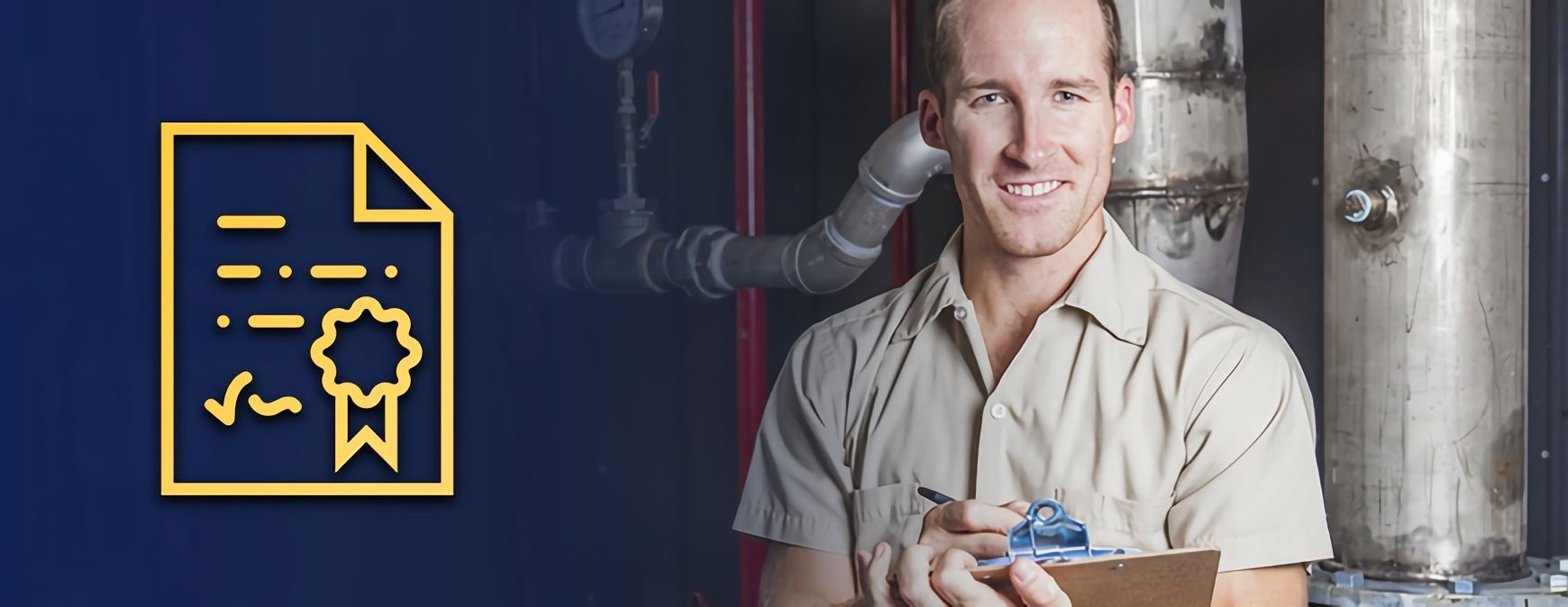
Becoming an HVAC technician is about so much more than learning the trade and landing a job. The reality is, this profession comes with a many more expectations than pure skill.
And if you plan on handling refrigerants, you’ll need Environmental Protection Agency (EPA) Section 608 Technician Certification. HVAC techs also need a license in some states.[1]
If you live in the Pacific Northwest (Alaska, Washington, Oregon), or if you intend to work up there, you need to know the licensing requirements.
Alaska HVAC Licensing Requirements

It may be called “The Last Frontier,” but the pay in Alaska is the second highest in the nation after the District of Columbia, making this a lucrative place to ply the HVAC trade.[2]
Get Started on the Path to a New Career
Fill out our form to learn how we can help you change your life.
HVAC technicians fall under three classifications in Alaska:
- Journeyman: No license required.
- HVAC Mechanical Administrator: License necessary.
- Mechanical Contractor: License required.
Let’s take a look at the requirements and permitted jobs for each classification.
Journeyman HVAC Technician License
If you work under the supervision of a licensed mechanical administrator as a journeyman HVAC tech, you do not need a license.[3]
Landing entry-level HVAC work in Alaska is really a matter of setting yourself apart from other job applicants. The Bureau of Labor Statistics reports that most employers prefer to hire workers with formal HVAC training, so trade school may be a good place to start out on this career path.[4]
HVAC Mechanical Administrator License
Techs interested in a supervisory role will need an HVAC mechanical administrator license. This credential allows them to manage job sites and personnel to ensure the work complies with relevant codes and is safe for the public.[5]
❖ Categories
Seven categories of licenses exist for HVAC mechanical administrators. Each category requires relevant work experience, education or both.
For example, “Residential HVAC” requires at least two years of experience as a journeyman HVAC tech. Up to two years of HVAC training can be substituted for work experience.
❖ Licensing Process
The Alaska Department of Commerce, Community and Economic Development grants HVAC mechanical administrator licenses. Submitting a notarized application with the necessary documents and taking an exam are the steps to becoming licensed.
❖ Necessary Documents
- Technical school transcripts
- A certificate in support of your experience and qualifications from three current or former employers. They must have firsthand knowledge of your work experience and qualifications.
- Proof of employment with an HVAC contractor
❖ Fees
- $50 application fee
- $250 license fee
- $125 exam fee[6]
Mechanical Contractor License
Do you want to run your own HVAC contracting business? This is the license for you. It allows you to bid and work on HVAC jobs without supervision.
❖ Licensing Process
Licenses are issued from the Alaska Department of Commerce, Community and Economic Development. You must have a valid HVAC mechanical administrator license to apply. Then you may complete the application packet and submit it with the necessary documents.
❖ Necessary Documents
- Proof of worker’ compensation insurance
- Documentation of a surety bond of $10,00
- A certificate of property damage and public liability insurance
❖ Fees
- $300 for application and registration[7]
Washington HVAC Licensing Requirements

Ranked as one of the best places to make a living by Forbes since 2013, the Evergreen State has a lot to offer HVAC technicians.[8]
The annual average salary is higher than the national average, for instance, and the concentration of HVAC jobs is greater than in other states.[9][10] If you want to make a difference in the world through your work, green jobs are also plentiful in Washington.
Washington requires HVAC technicians to have only an electrician license. Two types of electrician licenses exist:
- Trainee Electrician License: No prior education or work experience is necessary.
- Journey Electrician License: Work experience, education and the passage of an exam are required.[11]
Here are more details on how to obtain these licenses.
Trainee Electrician License
A trainee license allows you to work in the HVAC field under the supervision of a tech with a journey electrician license.
❖ Licensing Requirements
You must be at least 16 years old. Enrollment or registration with an apprenticeship program is also necessary.
❖ Licensing Process
Submit the application in person, by mail or online to the Washington State Department of Labor and Industries.
❖ Fees
- $37.90 for online applications
- $44.10 for applications submitted by mail[12]
General Journey Level Electrician License
This license allows work to be performed in all electrical specialties.
Requirements
- Proof of 8,000 hours of work as an electrician trainee supervised by a certified electrician. Industrial or commercial installation must account for 4,000 of the required hours.
-OR-
- Ninety-six hours of basic classroom instruction, along with documentation that you’ve met the work experience requirements in another state.
-OR-
- Verification that you’ve meet the training requirements while serving in the U.S. military.
-AND-
- Complete 48 hours of basic trainee classes[13]
Specialty Electrician License
If one type of HVAC tech work intrigues you more than others, you may also choose to get a license in a specialty, such as HVAC/refrigeration systems (6A) or HVAC/refrigeration-restricted (6B).
6A requires 4,000 hours of supervised work experience, while 2,000 hours is necessary for 6B, along with 48 hours of basic trainee classes.
❖ Licensing Process
Submit an application to the Washington State Department of Labor and Industries.
Once you receive approval, schedule a time to take the exam with independent testing center PSI.[14]
Oregon HVAC Licensing Requirements

Three things are especially plentiful in Oregon: trees, beavers and jobs.
In fact, Forbes ranked the Beaver State number one for job growth in 2017. With a positive employment outlook of 25 percent, the state holds promise for recent HVAC school grads looking to make their start in the industry.[15]
While it’s possible to work as an entry-level service technician or installer right out of HVAC school, you’ll need a license to perform construction projects costing $1,000 or more. Oregon’s Department of Consumer and Business Services offers two types of contractor licenses.[16]
- Limited Maintenance Specialty Contractor License: Training and relevant work experience is required.
- Commercial and Residential Contractor: Along with training and work experience, passage of an exam is necessary.
Let’s take a closer look at these two licenses.
Limited Maintenance Specialty Contractor License
The Limited Maintenance Specialty Contractor license allows you to perform electrical work while repairing, installing, servicing, maintaining or replacing HVAC appliances already existing in a building. It doesn’t permit this type of work if there isn’t already an existing installation of HVAC equipment.[17]
❖ Licensing Process
- Submit an application to the Oregon Department of Consumer and Business services with proof of work experience and training.
❖ Licensing Fees
- $75 licensing fee[18]
Commercial and Residential Contractor License
If you want to start your own HVAC contracting business, you’ll need a commercial and residential contractor license.
❖ Licensing Process
- Complete at least 16 hours of training on the laws governing business practices in Oregon and pass an exam on the information.[19]
- File your LLC, corporation or assumed business name with the Oregon Secretary of State.
- Submit a surety bond. Bond amounts range from $10,000 to $75,000, depending on the type of work you’ll be performing.[20]
- Turn in proof of general liability insurance.
- Get workers’ compensation insurance.
- Obtain state and federal tax numbers for your business.
- Submit the application with necessary certificates and documents.
❖ Fees
- $250 for a two-year license[21]
Start with HVAC Training
The Pacific Northwest holds a lot of potential for HVAC techs, from higher pay to greater job growth. Plus, you get to live in one of the most beautiful regions of the country!
But before you rush out into trying to qualify for any of these licenses or certifications, you’ll need the proper training first. Want to get on the road to making that happen? Contact us today.
Additional Sources
[1] https://www.bls.gov/ooh/installation-maintenance-and-repair/heating-air-conditioning-and-refrigeration-mechanics-and-installers.htm#tab-4
[2] https://www.bls.gov/oes/current/oes499021.htm
[3] https://www.hvacschool.org/alaska/
[4] https://www.bls.gov/ooh/installation-maintenance-and-repair/heating-air-conditioning-and-refrigeration-mechanics-and-installers.htm#tab-4
[5] https://hvactraining101.com/hvac-certification-alaska/
[6] https://www.commerce.alaska.gov/web/portals/5/pub/mec4033.pdf
[7] https://www.commerce.alaska.gov/web/Portals/5/pub/con4027.pdf
[8] https://www.forbes.com/pictures/efkk45ehige/no-1-best-state-to-make-a-living-washington/#4ea4c336cb50
[9] https://www.bls.gov/oes/current/oes_wa.htm
[10] https://www.bls.gov/oes/current/oes499021.htm
[11] https://www.lni.wa.gov/TradesLicensing/Electrical/LicenseExamEd/LicenseCert/
[12] https://www.lni.wa.gov/TradesLicensing/Electrical/LicenseExamEd/LicenseCert/Trainee/default.asp#2
[13] https://www.lni.wa.gov/TradesLicensing/Electrical/LicenseExamEd/LicenseCert/Trainee/default.asp#3
[14] https://www.lni.wa.gov/TradesLicensing/Electrical/LicenseExamEd/LicenseCert/Electrician/
[15] https://www.forbes.com/sites/karstenstrauss/2016/12/13/where-the-jobs-will-and-wont-be-in-2017/#1bec89e22e52
[16] https://www.homeadvisor.com/r/state-by-state-licensing-requirements/#Oregon
[17] https://www.oregonlaws.org/ors/479.630
[18] http://www.oregon.gov/bcd/Formslibrary/2888.pdf
[19] http://www.oregon.gov/CCB/licensing/Pages/pre-license-ed.aspx
[20] http://www.oregon.gov/CCB/licensing/Pages/suretybonds.aspx
[21] http://www.oregon.gov/CCB/licensing/Pages/get-licensed.aspx
This blog has been labeled as archived as it may no longer contain the most up-to-date data. For a list of all current blog posts, please visit our blog homepage at https://www.rsi.edu/blog/

